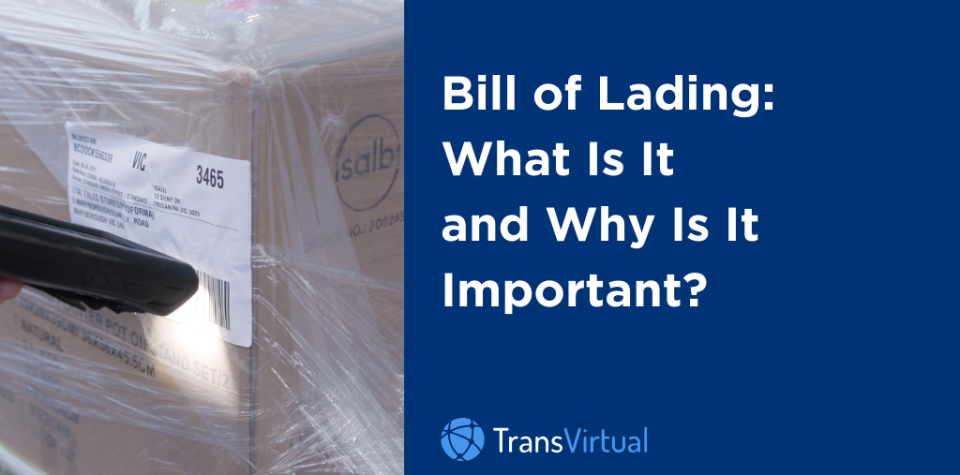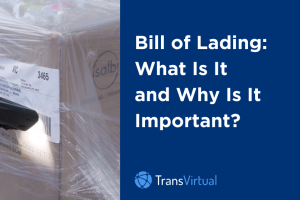Table of Contents
Bills of Lading are one of the most important and high-stakes aspects of the entire shipping process; they provide important information to all parties involved, including the transportation company and consignee.
Bills of Lading are one of the three crucial documents used in international shipment, along with a policy of insurance and an invoice. Bills of Lading are crucial for determining the responsibilities of everyone involved, and determining liability in the event that something goes wrong.
Today, we’re taking you through everything you need to know about Bills of Lading: what they are, why they’re important, and the information that they need to include.
What is a Bill of Lading as a Legal Document?
In 2017, the New South Wales district court defined a bill of lading as the following:
‘A document. Generally it must be signed by, or on behalf of, the carrier by sea. Three common characteristics of a bill of lading are that (a) it constitutes a receipt for the goods shipped or received by the carrier, (b) it constitutes a document of title for such goods and (c) it contains or evidences the contract of carriage by sea relating to the goods. A document which has all these characteristics will almost certainly be a bill of lading, and a document which lacks any of them will rarely be’
To translate the legalese, a bill of lading (BOL) is a legal document that is given to a shipper (the party that owns the goods) by a carrier (the party transporting the goods), and details the key information about the shipment, including its contents, weight, and destination.
A bill of lading also contains key details about the shipping journey. The main functions of a bill of lading are proof of contract, obligation for delivery, and proof of receipt.
For example, a manufacturer in Australia ships a container of wine to a retailed based in the United States. The shipping line issues a bill of lading, which lists the type and quantity of goods, shipper, consignee and the destination port. The retailer then uses the bill of lading to claim the goods upon arrival.
Endorsed order bills of lading can serve as collateral against debt, making them a valuable financial asset for securing loans or credit. Negotiable Bills of Lading can be used in trade finance to secure payments, financing, or credit arrangements for the shipment.
Types of Bill of Lading
Many people still think that bills of lading are only used for ships. However, there are several different types of bills depending on their mode of transportation including:
-
Order bill of lading – used when goods are shipped before payment
-
Clean bill of lading – a document that declares that there was no damage or loss throughout the shipment process
-
Straight bill of lading (also known as a consignment bill of lading) – a binding document that indicates all shipment must go through an authorised consignee
-
House bill of lading – used by freight forwarders to acknowledge receipt of their items for shipment
-
Ocean bill of lading – acts as the carrier receipt to the shipper and as a collection document or invoice
-
Multimodal bill of lading – used when there is more than one type of transportationmode during shipment
-
Received for shipment bill of lading – a document issued by a carrier that acts as evidence of receipt of goods for shipment
-
Claused bill of lading (sometimes call a “dirty bill of lading”) – a type of bill of lading that notes discrepancies, damages, or irregularities in goods
-
Surrender bill of lading – a type of negotiable BOL that exporters issue. It allows the transfer of goods to the importer when the original document is presented.
However, these generally include the same information. Additionally, electronic bills of lading (eB/L) are considered the legal and functional equivalent of paper bills of lading, replicating their core functions.
Bill of lading vs sea waybill
If you’re transporting goods via shipping lines, you might come across the words: sea waybill. These documents are used as an alternative to the bill of lading. The differences are that a sea waybill cannot serve as the document of title and are non-negotiable.
Why Do We Need Bills of Lading and What Are Their Main Functions?
You can think of a bill of lading as a kind of hybrid between a contract and a receipt. The bill of lading provides evidence of the agreement between parties and details the exact terms of that agreement for future reference. It can be used to settle disputes that may arise between the parties involved.
In contrast, a freight bill serves as an invoice or proof of shipping costs, highlighting the financial aspect of the shipment. The accuracy of information on the bill of lading is crucial, as it serves as a contract and a key document in case of disputes or insurance claims.
The bills of lading is also required to accompany the shipped products and be signed by the carrier, shipper and recipient. Within this role, the bill provides proof of the goods’ ownership as they travel. It’s also used to transfer the ownership of those goods to the recipient upon delivery. This happens when the recipient signs the bill, and can therefore also be used as a confirmation of the delivery’s success. For example, a bill of lading signed by all parties may be used to dispute a claim that goods were not received, protecting your business’ reputation and revenue.
All companies that offer transportation services need to generate bills of lading, as they’re a legal requirement for any shipment. This can act as important documentation if anything goes wrong throughout the process. Many times, carriers hold the original bill of lading until they receive payment from the shipper. This protects them from getting the runaround when it comes time for payment. By law, Bills of Lading need to be kept on file for at least 5 years in case of future issues.
What Should Be Included and Who Are the Parties Involved?
What you need to know is that the bill of lading covers all of the most important details about the shipment.
This includes:
-
Details about all parties involved in the shipment
-
The destination of the freight
-
The terms of the shipment
-
The mode of transportation
-
The contents of the shipment
The bill of lading issued must accurately list the consignee or their authorized representative to ensure proper delivery.
Perhaps the most critical point here is that the information included on a Bill of Lading needs to be accurate. It should also be reviewed by those with expertise in the field. Mistakes in the bill can be construed as deceptive conduct, and companies can face catastrophic fines for false information.
What’s more, make sure to take care in identifying the purpose for which the Bill is being issued – companies have also come under fire in the past for unintentionally producing misleading bills. This means that care and specificity is paramount.
The best way to avoid these mistakes is to entrust the Bill of Lading to an experienced forwarder, and seek legal advice when anything is unclear or amiss.
Final Thoughts
Although they are relatively simple documents, Bills of Lading are far more than meets the eye. This article has covered how the bills are vital to the transparency of the entire shipping process. They are legally important documents with the capacity to protect you and your business from fraud and misconduct from other parties.
A freight forwarder plays a crucial role in ensuring the accuracy and proper handling of bills of lading, which is essential for the smooth operation of your shipping activities.
Want to know more about bills of lading or have any more questions? Contact us for a chat today or alternatively you can book a free demo to see how our logistics software can help your business.


